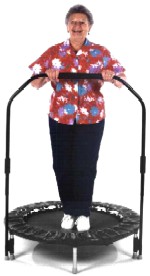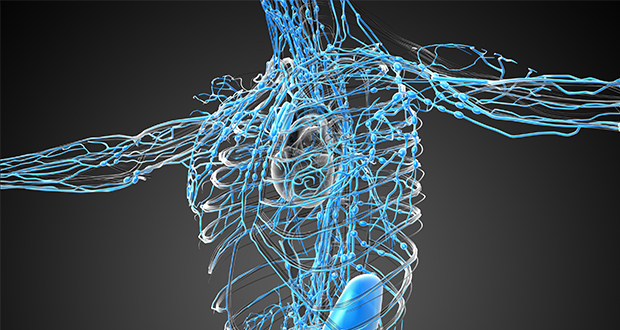How much do you know about your lymphatic system? Prior to being diagnosed with cancer, I knew swollen lymph nodes were a sign of illness, and that lymph nodes were often mentioned when dealing with cancer, but I didn't understand why. Since I consider myself an average person, I'm going to assume most of you have the same limited knowledge that I did, so I would like to share the importance of the lymphatic system and what you can do to maintain a healthy one. It's easier than you may think!
The lymphatic system is one of two major circulatory systems in the body--the other one being your blood (cardiovascular system)--and these two systems are interdependent, so that one cannot function without the other. The lymphatic system delivers immune cells throughout the body while transporting dead cellular waste and toxins to the blood system to be eliminated from the body. The lymphatic system is also responsible for absorbing excess fluids from the body. The lymphatic system is a key component of the immune system, and if you've read my previous articles, you know that a strong, functioning immune system is absolutely essential to prevent and fight cancer.
Think of the lymphatic system as a drainage system...if it becomes clogged or impeded in any way, it will move sluggishly or become completely blocked. Toxins and cell waste accumulate causing a burden on the body leading to any number of health conditions including cancer, while immune cells are prevented from reaching all areas of the body to do their job.
There are 500-700 lymph nodes in the body with concentrations of them located in the neck, chest, underarms and groin. Lymph nodes become swollen when disease-causing agents are trapped in these check points where immune cells are busy fighting them. Consider the fact that in conventional medicine, lymph nodes are often surgically removed in order to either determine the presence of cancer cells or because they are known to be cancerous. There are several problems with this standard procedure resulting in questions about whether lymph node removal does more harm than good.
First of all, it must logically be questioned whether it is wise to cut out lymph nodes, especially if they are just doing their job. It seems more logical to view cancerous nodes as having successfully trapped the cancer cells to be neutralized by immune cells. Does it make sense to cut apart a functioning system? Secondly, the side effects of lymph node removal can be permanently debilitating. Lymphedema is a condition of swelling in the arm(s) or leg(s) caused by the lymph system being unable to drain; this can lead to pain and loss of use in the affected limb. It is common for lymphedema symptoms to be delayed for weeks, months or even years after lymph node removal. Thirdly, studies have been done on breast cancer patients showing no statistical benefit to lymph node removal. The outcomes of patients undergoing lymph node removal were almost identical to those of patients who did not have lymph nodes removed.
My surgeon recommended a "sentinel lymph node biopsy" in conjunction with the lumpectomy of the tumor in my breast. He wanted to remove 2-3 of the lymph nodes closest to the tumor and test them for the presence of cancer cells. After I read that the sole purpose of the procedure was for the doctors to know whether or not to recommend chemotherapy treatment, and then confirmed that information with my surgeon the day before my surgery, I declined the lymph node biopsy. If a cancer patient has already made the decision either to have or to refuse chemotherapy, lymph node biopsy is unnecessary. I wanted my immune system intact and fully functioning, and I did not want the unnecessary risk of suffering from lymphedema down the road.
Now, let's discuss some ways you can keep your lymphatic system healthy.
- Exercise Unlike blood vessel walls which have muscles that contract to circulate the blood, lymphatic vessels do not have muscles. Lymph fluid is only pulled through the vessels as they respond to the body working against gravity. Exercise with an up-and-down motion is best--walking is okay, running is better, and rebounding is best. Rebounding is low-impact bouncing on a mini-trampoline called a "rebounder." The bouncing can even be done from a seated position. Exercise also increases the oxygen supply to muscles and cells, stimulating them to release toxins.


- Dry Brushing Dry brushing involves gently moving a coarse brush along the skin in the direction of the heart. (The main lymphatic drain is located at the heart.) This stimulates sweat glands and circulation below the skin which boost lymph flow.
- Hydration Lymphatic fluid is composed primarily of water, so adequate hydration is absolutely necessary for the lymphatic system to operate at it highest level. Drinking purified, mineralized water with antioxidants ingredients like lemon juice added is an easy way to promote detoxification.
- Chiropractic Correcting anatomical abnormalities or displacement in the upper chest region and rib cage (which acts as a critical lymphatic pump) from everyday activities helps to promote pressure within the thoracic region which allows the final dumping of toxins from the lymphatic system to the blood for cleansing.
- Anti-inflammatory Diet A healthy diet with lots of antioxidant fruits and vegetables and healthy fats is key to a healthy immune system. One reason the gut is linked to the immune system is the presence of lymphatic vessels at the site of the intestines. An unhealthy diet not only overburdens the immune system as a whole, but it can also easily damage those lymphatic vessels.
- Reduce Stress When you are under stress, your body--including your lymphatic system--is under stress. Use stress-reducing techniques such as regular stretching exercises, deep breathing, good posture, and massage therapy. Massage promotes the flow and drainage of lymph, improves the immune system, and can provide pain relief.
- Avoid Tight-Fitting Clothing Tight-fitting bras (especially under-wire bras) restrict the flow of lymph in the underarm areas and chest which is the main drainage area; tight underwear has the same effect in the groin area where lymph nodes abound.

There are many methods of detoxification, but if your body is dumping toxins and the systems that move the toxins out and eliminate them are sluggish or blocked, the accumulating toxins can cause serious problems. So show your lymph some love and keep it moving freely!
